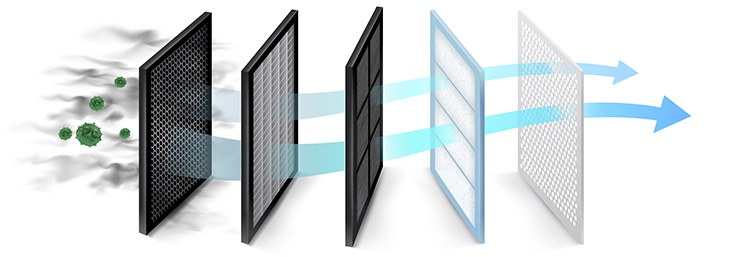
Posted: July 22, 2021 at 10:20 am
By: Lakes Region HVAC
It's been hot this summer, and we know you depend on your air conditioning system to stay cool and comfortable during the peak summer days in New Hampshire. So, when it comes time to change your AC filter, we know it's important to you that you choose the right one to keep your family from breathing in dust particles and other allergens.
You may be inclined to think that all filters are the same, but that's far from the truth. It's essential to take a few moments to do a little research before picking an AC filter for your system. You'll want to break down what kind to buy based on several factors. Each AC filter has a different size, quality, material, and design. Sometimes, the "best" product isn't the best for your system either.
First, you'll want to check the dimensions of your current filter. If you're not sure what what size filter to buy and you’re not sure what kind you bought last time, we can tell you the next time we tune-up your air conditioner, or a quick Google search of your system will show you what the manufacturer recommends for your specific system.
Second, think about what quality you'd like your filter to be. For this step, you'll want to look at the MERV ratings. MERV is an acronym for Minimum Efficiency Reporting Value and is graded from one to 20. While a higher ranking might seem appealing, this isn't always the case. You may want a higher grade filter if you have severe breathing-related health issues, but otherwise, we don't feel it necessary to use a filter with a MERV above 13. Generally, these higher grade filters are used in environments like hospitals and nursing homes. Your manufacturer may not even recommend this kind of filter since many AC units are engineered for use at home. Most of the AC systems of high quality are designed to run with a MERV level of 8 to 11. To read more about your home’s indoor air quality check out our blog here.

There are a few key differences between a more "common" MERV rating and a higher one. A higher MERV-rated filter will catch smaller particles, which means that your filter will fill up with debris far quicker and create too much resistance that'll overwork your system. So, if you're only concerned about common pollutants such as pollen, dust, or pet dander, then a standard MERV-rated filter is perfect for your home. Otherwise, you'll have to change your filter more frequently to ensure proper airflow and efficiency.
If mold or mildew is a concern of yours, it may be tempting to choose a higher grade filter. However, we feel it is best to use Indoor Air Quality products to ensure the safety of those living in your home. We are happy to discuss IAQ options that might be right for your family.
Lastly, take a look at the materials and design of the AC filters you're considering. Most filters use fiberglass as it's far more efficient. Polyester and pleated filters provide better air quality but will need to be changed more frequently. Accordian filters are more durable and will save you money in the long run. You can investigate HEPA (high-efficiency particulate air) filters, but it's unlikely you'll need that much air quality control unless your system is built for one. Once again, this kind of filter will need to be changed more frequently.
If you have any questions, please give us a call. We are also always happy to change your filter for you when it's time and can look over your whole system during your annual maintenance appointment.
If this article is useful to you, or if you know someone who can benefit from it, please Share it.
Have another question? Contact the Lakes Region team, and we’ll find your solution.
Our clients are homeowners, small business owners, and corporations—and one could be you by calling 603-286-2290 or emailing info@lrhvac.com.
Lakes Region’s expert service technicians and installers are trained in the latest advancements in heating and cooling technologies. We'll help you select the correct comfort system for your home, ensuring that your equipment operates at the highest efficiency — giving you the lowest monthly operating cost.
Visit our website.
LRHVAC’s office hours: Monday - Friday
7:30-4:30
Phone: 603-286-2290
Mail: 86 Bay Hill Rd., Northfield, NH 03276
Email:
Email us